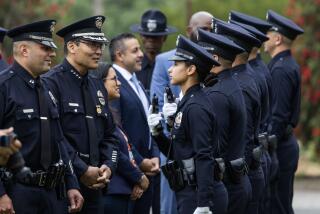CALIFORNIA COMMENTARY : Army of Occupation Won’t Work : Social values disappear and the poor grow poorer. That’s why law enforcement can’t hold back the tide of crime.
- Share via
When fundamental government and societal infrastructures begin to fall apart, a collapse of the social order will surely follow. I am convinced that today we are seeing large cracks in those infrastructures and that this is one of the underlying causes of the dramatic increase in our crime rate.
When the crime rate began to increase dramatically, it was the poverty-bound areas of the community that were the first neighborhoods to be victimized by a deluge of violent and senseless crimes, drug abuse and sociopathic street gangs. But crime and drugs and violence are highly mobile creatures. They don’t stop at the railroad tracks, and today, all of our communities are feeling it in one way or another.
I think we need to understand what a seemingly routine pattern of violence has done to us. It has certainly desensitized us. We seem to have developed an amazing tolerance for violence. While very young children are dying at an alarming rate in our community, being born addicted to drugs, being beaten to death by parents or being shot down in the cross-fire of a turf dispute, just how outraged are we? Frankly, not very.
Are the newspapers overwhelmed with letters of protest? It’s rare. In fact, it’s more likely that these letters will contain cries for stiffer criminal penalties and for more iron-willed judges, rather than for improved educational programs, or for more job training or more recreation opportunities.
By now you are probably thinking, “Has the sheriff lost his mind? Why isn’t he asking for more jails and for more officers?” I have and I will continue to do so. We certainly need them. However, the problem is larger and more complex than just applying penal solutions. We must rebuild our communities, not simply contain them when they begin to crumble. It is not an either/or situation.
As we struggle to return social order to our streets, violent conflicts will continue. People who rightly or wrongly feel that they have been disenfranchised will tend to remain at odds with the police, because it is the police who must act as the authority for government. We are the most visible representatives of government, and when government can’t meet the needs of large numbers of its citizens, it can become a no-win, high-risk situation for the law enforcement officer working in the streets.
That, I fear, is the situation we are all too rapidly approaching. Law enforcement is being vilified in the press. Increasingly violent contacts between police and criminal suspects have encouraged a flood of civil suits. In fact, the filing of police malpractice suits has become a growth industry. If the seemingly insatiable appetite for government’s deep-pocket dollars is not controlled, we may find that law-enforcement services could become as unaffordable as medical services have become. There must be limits.
Am I going to blame the journalists for our predicament? Of course not. They’ve got a product to sell. I only ask that they report events accurately and confine opinions to those pages labeled as such.
Do we law officers make mistakes? Of course we do. Do we ever have errant employees? Of course. Yes, sometimes even brutal and dishonest ones. We discipline, discharge, and even prosecute our people whenever we discover such repugnant conduct. We try very hard to ensure that we have structures and procedures in place to keep these isolated incidents at an absolute minimum. When there are more than 12,000 people in an organization, there will be mistakes. There will be problem employees.
If our internal procedures and safeguards fail to provide a fix, then there are remedies in law and there are competent, professional attorneys and jurists to ensure that they are properly applied. As painful as that sometimes may be for us, we believe in that process. Our system has all sorts of checks and balances built into it. We would not have it any other way.
I would ask, however, that there be some recognition of the fact that Los Angeles and for that matter most other large American cities, are not the same cities that they were in the 1950s. I especially take strong exception to the allegation that violence between police and criminal suspects is created deliberately by law enforcement.
That simply is not the case. I will tell you here and now, law enforcement didn’t create today’s social problems, nor are we to be held accountable for the violence that flows from them.
The truth is that parts of our communities are coming apart at the seams and that violence--serious, bullet-spewing violence--is becoming an everyday part of our community life. Society has been asking its police to deal with the outgrowth of years of neglect of the more basic needs of education, health care, transportation and human resources.
But law enforcement is not the best answer for our social ills and it should not be used as an army of occupation in the streets of America.
More to Read
Sign up for Essential California
The most important California stories and recommendations in your inbox every morning.
You may occasionally receive promotional content from the Los Angeles Times.










